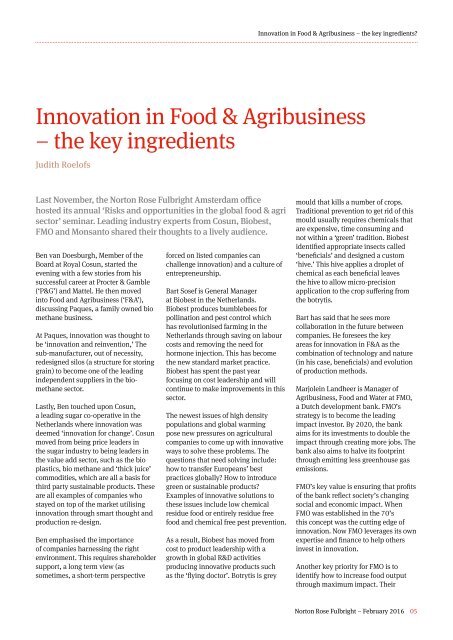Cultivate
cultivate-issue-10-137123
cultivate-issue-10-137123
You also want an ePaper? Increase the reach of your titles
YUMPU automatically turns print PDFs into web optimized ePapers that Google loves.
Innovation in Food & Agribusiness – the key ingredients?<br />
Innovation in Food & Agribusiness<br />
– the key ingredients<br />
Judith Roelofs<br />
Last November, the Norton Rose Fulbright Amsterdam office<br />
hosted its annual ‘Risks and opportunities in the global food & agri<br />
sector’ seminar. Leading industry experts from Cosun, Biobest,<br />
FMO and Monsanto shared their thoughts to a lively audience.<br />
Ben van Doesburgh, Member of the<br />
Board at Royal Cosun, started the<br />
evening with a few stories from his<br />
successful career at Procter & Gamble<br />
(‘P&G’) and Mattel. He then moved<br />
into Food and Agribusiness (‘F&A’),<br />
discussing Paques, a family owned bio<br />
methane business.<br />
At Paques, innovation was thought to<br />
be ‘innovation and reinvention,’ The<br />
sub-manufacturer, out of necessity,<br />
redesigned silos (a structure for storing<br />
grain) to become one of the leading<br />
independent suppliers in the biomethane<br />
sector.<br />
Lastly, Ben touched upon Cosun,<br />
a leading sugar co-operative in the<br />
Netherlands where innovation was<br />
deemed ‘innovation for change’. Cosun<br />
moved from being price leaders in<br />
the sugar industry to being leaders in<br />
the value add sector, such as the bio<br />
plastics, bio methane and ‘thick juice’<br />
commodities, which are all a basis for<br />
third party sustainable products. These<br />
are all examples of companies who<br />
stayed on top of the market utilising<br />
innovation through smart thought and<br />
production re-design.<br />
Ben emphasised the importance<br />
of companies harnessing the right<br />
environment. This requires shareholder<br />
support, a long term view (as<br />
sometimes, a short-term perspective<br />
forced on listed companies can<br />
challenge innovation) and a culture of<br />
entrepreneurship.<br />
Bart Sosef is General Manager<br />
at Biobest in the Netherlands.<br />
Biobest produces bumblebees for<br />
pollination and pest control which<br />
has revolutionised farming in the<br />
Netherlands through saving on labour<br />
costs and removing the need for<br />
hormone injection. This has become<br />
the new standard market practice.<br />
Biobest has spent the past year<br />
focusing on cost leadership and will<br />
continue to make improvements in this<br />
sector.<br />
The newest issues of high density<br />
populations and global warming<br />
pose new pressures on agricultural<br />
companies to come up with innovative<br />
ways to solve these problems. The<br />
questions that need solving include:<br />
how to transfer Europeans’ best<br />
practices globally? How to introduce<br />
green or sustainable products?<br />
Examples of innovative solutions to<br />
these issues include low chemical<br />
residue food or entirely residue free<br />
food and chemical free pest prevention.<br />
As a result, Biobest has moved from<br />
cost to product leadership with a<br />
growth in global R&D activities<br />
producing innovative products such<br />
as the ‘flying doctor’. Botrytis is grey<br />
mould that kills a number of crops.<br />
Traditional prevention to get rid of this<br />
mould usually requires chemicals that<br />
are expensive, time consuming and<br />
not within a ‘green’ tradition. Biobest<br />
identified appropriate insects called<br />
‘beneficials’ and designed a custom<br />
‘hive.’ This hive applies a droplet of<br />
chemical as each beneficial leaves<br />
the hive to allow micro-precision<br />
application to the crop suffering from<br />
the botrytis.<br />
Bart has said that he sees more<br />
collaboration in the future between<br />
companies. He foresees the key<br />
areas for innovation in F&A as the<br />
combination of technology and nature<br />
(in his case, beneficials) and evolution<br />
of production methods.<br />
Marjolein Landheer is Manager of<br />
Agribusiness, Food and Water at FMO,<br />
a Dutch development bank. FMO’s<br />
strategy is to become the leading<br />
impact investor. By 2020, the bank<br />
aims for its investments to double the<br />
impact through creating more jobs. The<br />
bank also aims to halve its footprint<br />
through emitting less greenhouse gas<br />
emissions.<br />
FMO’s key value is ensuring that profits<br />
of the bank reflect society’s changing<br />
social and economic impact. When<br />
FMO was established in the 70’s<br />
this concept was the cutting edge of<br />
innovation. Now FMO leverages its own<br />
expertise and finance to help others<br />
invest in innovation.<br />
Another key priority for FMO is to<br />
identify how to increase food output<br />
through maximum impact. Their<br />
Norton Rose Fulbright – February 2016 05


